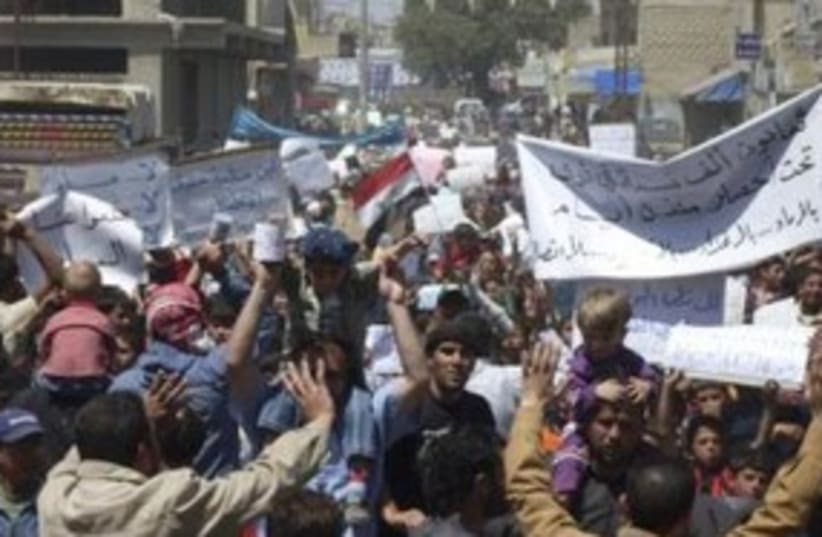RELATED:Editorial: Syria’s curious pleaSyria defers run for seat of UN Rights CouncilThousands of people also converged on a square in the Syrian city of Hama for a pro-democracy demonstration, a witness said."I am moving among a huge crowd... They are coming from every direction," said a witness in Hama where the military crushed an Islamist-led uprising in 1982.Earlier Friday,a United Nations human rights office in Geneva said the death toll in Syria may be as high as 850 and thousands of demonstrators have been arrested during a two-month military crackdown."We again call on the government to exercise restraint, to cease use of force and mass arrests to silence opponents," Rupert Colville, spokesman of the UN High Commissioner for Human Rights, told a news briefing.The toll of 700-to-850 dead, based on information provided by human rights activists, was "quite likely to be genuine", he added.Syria has blamed most of the violence on "terrorist groups" backed by Islamists and foreign agitators. But a rights campaigner, speaking ahead of Friday prayers that have become a rallying point for protesters, said President Bashar Assad has ordered troops not to fire on pro-democracy demonstrators.A high-level UN human rights mission was preparing to go to Syria, as well as neighboring countries, but had not yet received a reply from Damascus, according to Colville."We hope to be ready to deploy as soon as we are granted access," he said."We have many reports of use of snipers, use of tanks in a number of towns. The government is reporting that soldiers and police have been killed, that is why we want to get in there and see for ourselves," he added.Colville also voiced concern about arrest and torture of dissidents in Bahrain, including the death of four detainees while in custody, and announced that Yemen had accepted a visit by a UN human rights mission, suggesting a date of late June.On Thursday, Syrian forces surrounded Hama, the scene of a bloody 1982 crackdown by the father of President Bashar Assad, and dispersed a rally in the second city of Aleppo, in the latest signs that the unrest could turn into a drawn-out, bloody revolt.The Associated Press quoted a human rights activist saying troops backed by tanks had deployed around Hama, a central city in which then-president Hafez Assad killed some 20,000 people in putting down a Muslim Brotherhood insurrection.In Aleppo, 2,000 students rallied at the city’s prestigious university in the first indication that the rebellion had reached the northern city.Tanks advanced in the southern towns of Dael, Tafas, Jassem and al-Harra – just a few kilometers east of the Golan Heights – ahead of post-prayer Friday demonstrations that have become hallmarks of the so-called “Arab Spring.”
Protests erupt in Hama, eastern Syria as death toll rises
Demonstrators chant "we want overthrow of regime"; thousands arrested; UN rights office says up to 850 killed in Syrian unrest.

RELATED:Editorial: Syria’s curious pleaSyria defers run for seat of UN Rights CouncilThousands of people also converged on a square in the Syrian city of Hama for a pro-democracy demonstration, a witness said."I am moving among a huge crowd... They are coming from every direction," said a witness in Hama where the military crushed an Islamist-led uprising in 1982.Earlier Friday,a United Nations human rights office in Geneva said the death toll in Syria may be as high as 850 and thousands of demonstrators have been arrested during a two-month military crackdown."We again call on the government to exercise restraint, to cease use of force and mass arrests to silence opponents," Rupert Colville, spokesman of the UN High Commissioner for Human Rights, told a news briefing.The toll of 700-to-850 dead, based on information provided by human rights activists, was "quite likely to be genuine", he added.Syria has blamed most of the violence on "terrorist groups" backed by Islamists and foreign agitators. But a rights campaigner, speaking ahead of Friday prayers that have become a rallying point for protesters, said President Bashar Assad has ordered troops not to fire on pro-democracy demonstrators.A high-level UN human rights mission was preparing to go to Syria, as well as neighboring countries, but had not yet received a reply from Damascus, according to Colville."We hope to be ready to deploy as soon as we are granted access," he said."We have many reports of use of snipers, use of tanks in a number of towns. The government is reporting that soldiers and police have been killed, that is why we want to get in there and see for ourselves," he added.Colville also voiced concern about arrest and torture of dissidents in Bahrain, including the death of four detainees while in custody, and announced that Yemen had accepted a visit by a UN human rights mission, suggesting a date of late June.On Thursday, Syrian forces surrounded Hama, the scene of a bloody 1982 crackdown by the father of President Bashar Assad, and dispersed a rally in the second city of Aleppo, in the latest signs that the unrest could turn into a drawn-out, bloody revolt.The Associated Press quoted a human rights activist saying troops backed by tanks had deployed around Hama, a central city in which then-president Hafez Assad killed some 20,000 people in putting down a Muslim Brotherhood insurrection.In Aleppo, 2,000 students rallied at the city’s prestigious university in the first indication that the rebellion had reached the northern city.Tanks advanced in the southern towns of Dael, Tafas, Jassem and al-Harra – just a few kilometers east of the Golan Heights – ahead of post-prayer Friday demonstrations that have become hallmarks of the so-called “Arab Spring.”